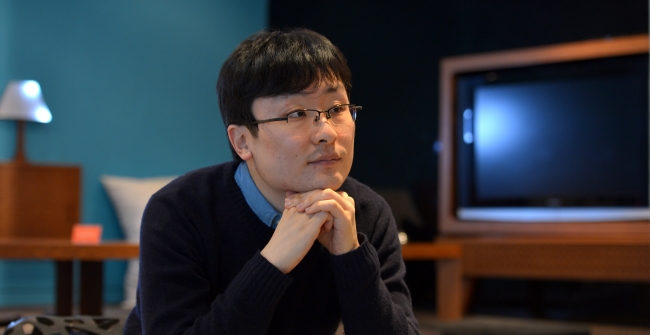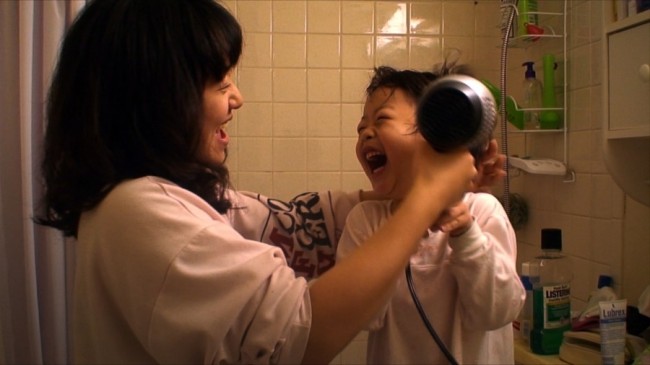Migration, relocation and a pregnancy
Filmmaker Park Moon-chil shares his unusual family history in latest documentary ‘My Place’
By Claire LeePublished : Jan. 22, 2014 - 19:40

Filmmaker Park Moon-chil was alone with his mother in a car in 2006 when she broke the shocking news to him: His unmarried sister was pregnant.
“My mother said something like, ‘It looks like you are going to be an uncle soon,’” Park told The Korea Herald during an interview in Seoul on Tuesday. “I literally did not understand at first. I thought she was talking about a relative having a baby or something.”
Park’s latest documentary, “My Place,” is a deeply personal account of his own family, especially his sister’s unexpected pregnancy and what followed. Yet the film isn’t just about a single mom; Park deftly weaves the stories of migration, relocation and displacement into his family history, which ultimately offers a resonating cinematic experience.

Park and his sister, Peace, were born in Toronto, Canada, to their Korean immigrant parents. His mother was a daughter of Moon Ik-hwan (1918-1994), a well-known pastor and social activist who was nominated for the Nobel Peace Prize in 1992. Park’s uncle ― his mother’s brother ― is the noted veteran actor Moon Sung-keun.
When Moon-chil and Peace were attending elementary school, their parents decided to move back to Korea, giving up their lives in Toronto. The main reason behind the decision was his mother’s family. They were involved in the pro-democracy movement in Korea in the 1980s, and she wanted to be there for them.
“When we were young, our parents would tell us that they moved back to Korea because of us,” Park said. “They’d tell us that they wanted to raise us as Koreans. And my mother was not too comfortable with the idea of raising her children in an environment where she might not be able to communicate with them properly. When we were in Toronto, my sister would sometimes not understand what my mother said in Korean, even when she was giving a scolding.”
When Park’s parents moved back to Korea, they were more worried about Park than his sister, because he had spent more time in Canada than she had. But it was Peace who had a harder time adjusting to her life in Korea. She was not happy with the competition-driven education system, the way girls were treated by the boys and the way her teachers treated her.
“Some of the stories she told me on camera were actually totally new to me,” he said.
“When she was in middle school, one of her teachers told her to stand outside the classroom as punishment. And all of the students’ daily homework was to write down everything the teacher said during each and every class. Because my sister was outside the classroom, she could not do the homework that day. When she told him that the next day, he made her stand outside the classroom again for not doing the homework. She would tell him she couldn’t do the daily homework for the same reason the next day, and he would tell her to go outside the classroom again. And apparently this went on for the entire semester.”
Peace is certainly one of the most captivating characters in the movie. The film records her courageous journey to retrieve what she thinks she lost: She always wanted to live in Canada, but she was relocated. She always wanted a baby, but her partner did not want the same thing. She pursues her dreams anyway: She gives birth to her son Soul, returns to Canada with him as a single mother and with her mother’s help, attends school to become a teacher. And her life somehow overlaps with those of her parents, who were born in Korea, moved to Canada and gave up what they accomplished there to return to Korea.
“I think I was touched by her decisiveness, and her ability to go for what she wants,” Park said, admitting that he didn’t think Peace was “ready to have a baby” when he learned she was pregnant for the first time. “I tend to think too much and think about what others would say. But she’s confident and comfortable with who she is and what she wants. I felt like I should look for the things that I want, rather than what the society wants from me.”
Park said he received a diverse response from viewers, including a mother whose daughter had difficulty adjusting to Korea’s school system after being raised in the U.K., single mothers in Korea and Koreans who have been adopted by foreign parents at a young age.
“Through this movie, I learned that many Korean adoptees are vocal about issues about single mothers who are very often stigmatized in Korea, because they assume that was one of the reasons why their biological mothers had to send them away for adoption,” Park said. “I hope many parents of single mothers watch this film and find ways to empathize with their daughters’ decisions.”
The film won an audience award during last year’s ChewSock Film Festival, a cultural event geared toward expats during Chuseok.
“My Place” opens in theaters on Jan. 30. English subtitles will be provided for all screenings at the KT&G Sangsang Madang Theater in Hongdae district in Seoul.
Two other theaters in Seoul ― Indieplus near Sinsa Station and Indie Space near Gwanghwamun Station ― will also provide English subs for screenings from Jan. 29 to Feb. 4.
By Claire Lee (dyc@heraldcorp.com)



















